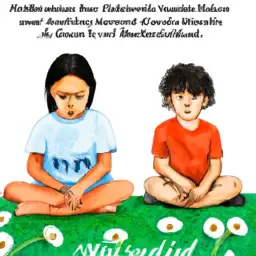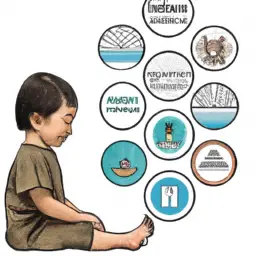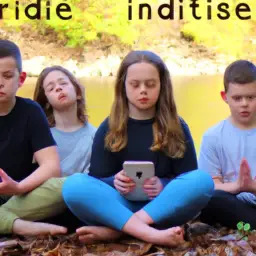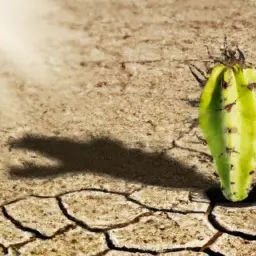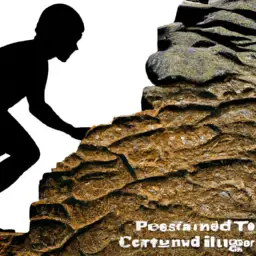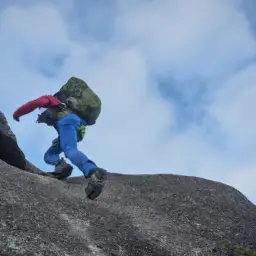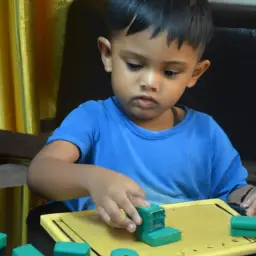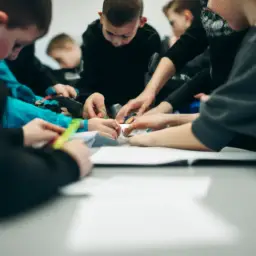As a parent, you want to equip your child with the tools they need to succeed in life. One of the most important skills you can help them develop is grit. Grit is the ability to persevere through challenges and setbacks, to stick with a task even when it’s difficult, and to bounce back from failure.
And one way to cultivate grit in your child is through mindfulness practices. Mindfulness is the practice of being present in the moment, without judgment. By teaching your child to be mindful, you can help them develop greater self-awareness, emotional regulation, and focus.
When combined with other strategies for building resilience, such as fostering a growth mindset and encouraging positive thinking, mindfulness can help your child develop the grit they need to thrive in school, work, and life.
In this article, you’ll learn six must-know tips for incorporating mindfulness practices into your parenting strategy to help your child develop grit.
Key Takeaways
- Grit is important for children to develop as it helps them handle setbacks and disappointments.
- Mindfulness practices, such as being present in the moment and mindful breathing exercises, can help children develop grit and improve emotional regulation skills.
- Encouraging positive thinking and a growth mindset, while also modeling mindful behavior, can help promote resilience and perseverance in children.
- Making mindfulness a daily practice can help children develop inner strength that will serve them well throughout their lives.
Understand the Concept of Mindfulness and Grit
You need to understand the powerful connection between mindfulness and grit if you want to help your child develop the resilience needed to overcome challenges and succeed in life.
Mindfulness, which involves being present in the moment and accepting one’s thoughts and feelings without judgment, has numerous benefits for children’s mental health. It can help reduce stress, anxiety, and depression, and improve overall well-being.
When children practice mindfulness, they develop better emotional regulation skills, which can help them navigate difficult situations with more ease.
On the other hand, grit is the perseverance and passion for long-term goals, even when faced with obstacles and failures. The role of grit in achieving success cannot be overstated.
Children who develop grit are better equipped to handle setbacks and disappointments, and are more likely to persist in the face of challenges.
Mindfulness practices can help children develop grit by increasing their self-awareness, teaching them to stay focused on their goals, and helping them develop a growth mindset.
By combining mindfulness and grit, parents can help their children develop the resilience and determination needed to thrive in life.
Practice Mindful Breathing Exercises
Start with a simple breathing exercise – take slow, deep breaths and focus on the sensation of air filling and leaving your body. This is the first step in incorporating mindfulness practices to develop grit in your child.
Mindful breathing exercises are simple yet effective ways to teach children to stay present in the moment and improve their ability to focus. There are numerous benefits of mindfulness, including reducing stress, increasing self-awareness, and improving overall well-being.
Age-appropriate breathing techniques can help children regulate their emotions, calm their minds, and improve their ability to concentrate. Encourage your child to take a few moments every day to practice mindful breathing exercises, and over time, they will develop an invaluable skill that will serve them well throughout their lives.
Encourage Gratitude and Positive Thinking
Encouraging gratitude and positive thinking can have a profound impact on a child’s outlook on life, fostering a sense of appreciation and optimism that will help them navigate challenges with resilience. By encouraging your child to keep a gratitude journal, you can help them focus on the good things in their life, no matter how small. This can help them develop a habit of looking for the positive in any situation, which can be incredibly valuable as they face obstacles and setbacks.
Another way to encourage positive thinking is through positive affirmations. This involves regularly saying positive statements to yourself or your child, such as "I am capable"or "I can do hard things". This can help your child develop a growth mindset, which is the belief that their abilities can improve with effort and practice. By focusing on positive affirmations, your child can develop a sense of self-efficacy and confidence that will help them tackle challenges with a can-do attitude.
Foster a Growth Mindset
Get ready to develop a growth mindset in your child by using positive affirmations and focusing on the belief that their abilities can improve with effort and practice.
Teaching resilience and developing perseverance are essential in fostering a growth mindset. Encourage your child to take risks, learn from mistakes, and understand that failure is not a permanent state.
To develop a growth mindset, teach your child to embrace challenges as opportunities for growth and learning. Encourage them to set goals and work towards them with dedication and persistence.
Remind them that setbacks and obstacles are a natural part of the learning process, and that with perseverance and effort, they can overcome any challenge.
By cultivating a growth mindset in your child, you’re setting them up for success not only in academics, but also in their personal and professional lives.
Model Mindful Behavior
Modeling mindful behavior is crucial in promoting a sense of calm and emotional regulation in your child. Children are highly influenced by their parents, and they tend to model their behaviors after them. Therefore, if you want to develop grit in your child, it’s essential that you lead by example and practice mindfulness yourself. By doing so, you’ll not only be setting a positive example for your child, but you’ll also be creating an environment of mindfulness that will help your child develop the necessary skills to face challenges with resilience.
Here are three ways you can model mindful behavior for your child:
-
Practice mindfulness in your daily life: Incorporate mindfulness techniques in your daily routine, such as taking a few deep breaths before starting a task or taking a mindful walk in nature. By doing so, your child will see that mindfulness is a normal part of life, and they’ll be more likely to incorporate it into their own lives.
-
Use guided meditations: Guided meditations are an excellent way to introduce your child to mindfulness practices. You can find many kid-friendly guided meditations online, or you can create your own. By practicing guided meditations with your child, you’ll be teaching them how to focus their attention, which is a crucial skill when it comes to developing grit.
-
Be present: When you’re spending time with your child, make an effort to be fully present. Put away your phone, turn off the TV, and give your child your undivided attention. By doing so, you’ll be teaching your child the importance of being present and engaged in the moment. This skill will help them develop resilience and grit as they learn to focus on the task at hand and persevere through challenges.
Make Mindfulness a Daily Practice
To make mindfulness a part of your daily routine, try starting your day with a few minutes of deep breathing or a short meditation session. This can help you set a positive tone for the day ahead and give you the space to focus on your breath and calm your mind.
As you go about your day, look for opportunities to incorporate mindful activities and routines. For example, take a few moments to pause and breathe before responding to a stressful situation. You can also practice gratitude by reflecting on the things you’re thankful for.
Making mindfulness a daily practice doesn’t have to be complicated or time-consuming. Even just a few minutes of mindfulness each day can help you develop a greater sense of awareness and resilience, which can be incredibly valuable for both you and your children.
By making mindfulness a priority in your daily routine, you can help your children develop grit and inner strength that will serve them well throughout their lives.
Frequently Asked Questions
Can mindfulness and grit be developed in children of any age?
Yes, mindfulness and grit can be developed in children of any age. Mindfulness has numerous benefits for children, including improved focus, reduced stress and anxiety, and increased emotional regulation. Mindfulness techniques can be adapted for different age groups, such as using breathing exercises or visualizations for younger children and discussing emotions and thoughts for older children.
Developing grit, or perseverance and resilience, can also be fostered through mindfulness practices. Mindfulness can help children learn to approach challenges with a growth mindset and develop the ability to bounce back from setbacks.
Overall, incorporating mindfulness practices into your child’s routine can have a positive impact on their well-being and success.
What are some examples of growth mindset activities that parents can engage in with their children?
To help develop a growth mindset in your children, there are many fun mindfulness activities you can engage in as part of your mindful parenting strategies.
For example, you can encourage them to keep a gratitude journal where they write down three things they’re thankful for each day. You can also challenge them to try new things and learn from their mistakes, emphasizing that failure is just a step towards success.
Additionally, you can play games that require problem-solving and creativity, such as puzzles or building with blocks. By incorporating these activities into your family routine, you can help your children develop a growth mindset and become more resilient.
How can parents incorporate mindfulness practices into their child’s daily routine?
To incorporate mindfulness practices into your child’s daily routine, start by practicing mindful parenting. This means being present and fully engaged with your child in the moment, without distractions.
Encourage your child to practice mindful breathing exercises by taking a few deep breaths together before starting a task or during times of stress.
You can also incorporate mindfulness into daily activities such as eating, by encouraging your child to pay attention to the taste, texture, and smell of their food.
As your child learns to be more mindful, they’ll develop the ability to focus, regulate their emotions, and build resilience.
Are there any potential drawbacks or risks associated with practicing mindfulness in children?
When it comes to mindfulness practices in children, there are both potential risks and benefits to consider.
On the one hand, research has shown that mindfulness can lead to improved emotional regulation, better academic performance, and reduced stress and anxiety. Additionally, teaching children mindfulness techniques at a young age can set them up for a lifetime of healthy coping strategies.
However, some experts have cautioned that mindfulness practices may not be appropriate for all children, particularly those who have experienced trauma or have a history of mental health issues.
As with any new practice, it’s important to consult with a healthcare professional and proceed with caution to ensure that mindfulness practices are safe and effective for your child.
How can parents measure the progress of their child’s mindfulness and grit development?
Assessing progress and setting goals can be an effective way for parents to measure their child’s mindfulness and grit development. As a parent, you can start by identifying specific behaviors and skills that you want your child to improve or develop.
Then, you can track their progress through observation, feedback from teachers or other caregivers, and self-reflection. It’s also important to celebrate small successes and set achievable goals with your child to keep them motivated and engaged in their mindfulness and grit practices.
Regular check-ins and open communication can help you and your child stay on track and make adjustments as needed.
Conclusion
So, there you have it – six must-know tips for parents who want to incorporate mindfulness practices to develop grit in their children.
Remember, mindfulness is all about being present in the moment and cultivating a non-judgmental awareness of your thoughts and feelings. By teaching your children to be mindful, you’ll be setting them up for success in all areas of life.
Encouraging gratitude, fostering a growth mindset, modeling mindful behavior, and making mindfulness a daily practice are all powerful ways to help your children develop grit and resilience.
So why not start incorporating these tips into your daily routine today? With time and practice, you’ll be amazed at how much your child’s mindset can shift towards one of growth and resilience.










